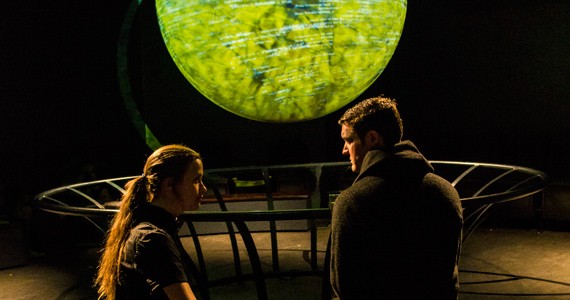"The thing about theatre is, theatre doesn't tend to do epic very well." Those are very curious words coming from Michael MacPhee, the creative director of The Doppler Effect and the writer-director of the company's latest play, the entirely ambitious, instant Fringe hit Tribe of One.
Set 450 years from now, after we've ruined and over-populated the world, Tribe of One centres on Del Zwicker—a well-trained, lonely psychopath using math over empathy to make the world's toughest choices, all in the name of the Greater Good.
"I had watched a documentary about psychopaths being an evolutionary advantage, and how we need psychopaths to make hard decisions to build something greater," says MacPhee. "I became enamoured with the idea of a society that would revere them while knowing that they were dangerous." Using the Museum of Natural History's Science on a Sphere room as its stage, and Nick Bottomley's artful projections as a backdrop, the audience gets strangely intimate front row seat to Zwicker's chilling command centre.
In creating a futuristic, abbreviated language for the show, MacPhee arrived upon another ambitious move—two casts. "I made really specific choices about where I think language is going and one of those was gender-neutral," he says. "When I realized I was writing gender-neutral language I thought, you know what? I could cast a guy or a girl for any of these roles. That's a lot of freedom." Reimagining the typical theatre archetypes of the protagonist, love interest and mentor, MacPhee cast Alpha (starring Mary Fay Coady as Del) and Omega (with Sean Skerry as Del), which alternate nightly. Annie Valentina, Kim Parkhill and Jake Willett also star.
Tribe of One is a lot of things at once. It's an introduction to Cadimus Protocol—a fictional population control and eugenics program, and real-life transmedia project—and a warm-up for The Contribution, a Doppler show set for December. But behind its epic sci-fi layers, it's really just a powerful story about morality and humanity that can stand on its own.
Thursday, September 4-Sunday, September 7 at 8pm
Museum of Natural History, Science on a Sphere room

